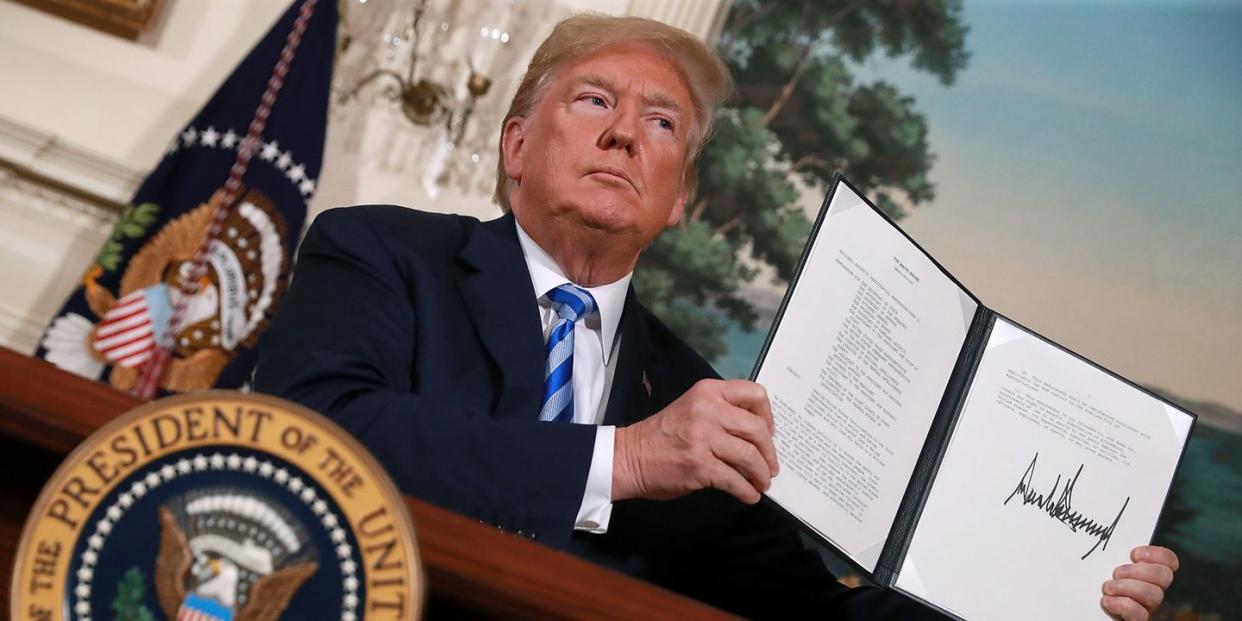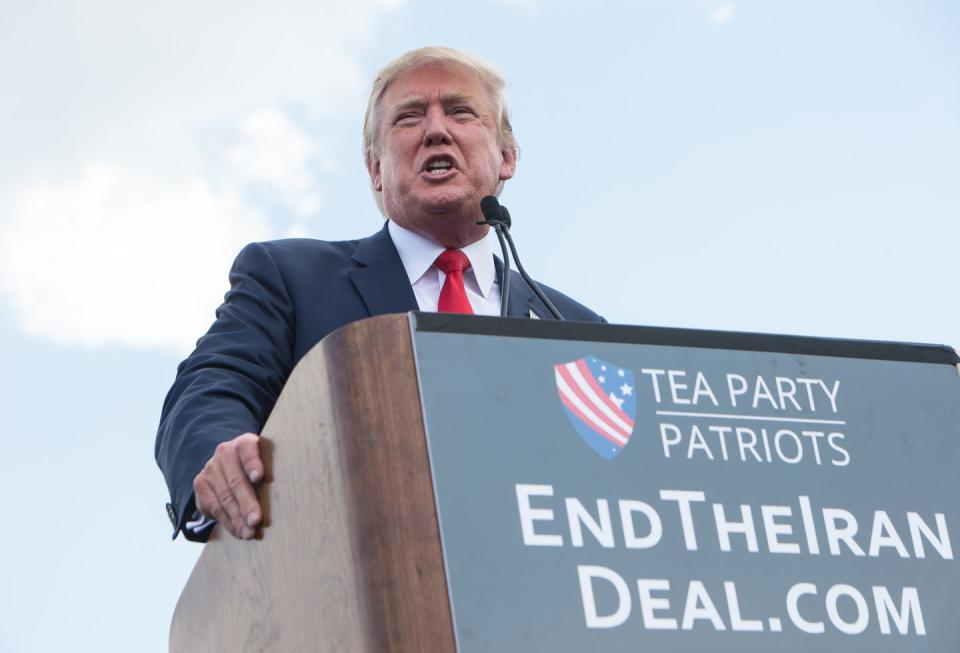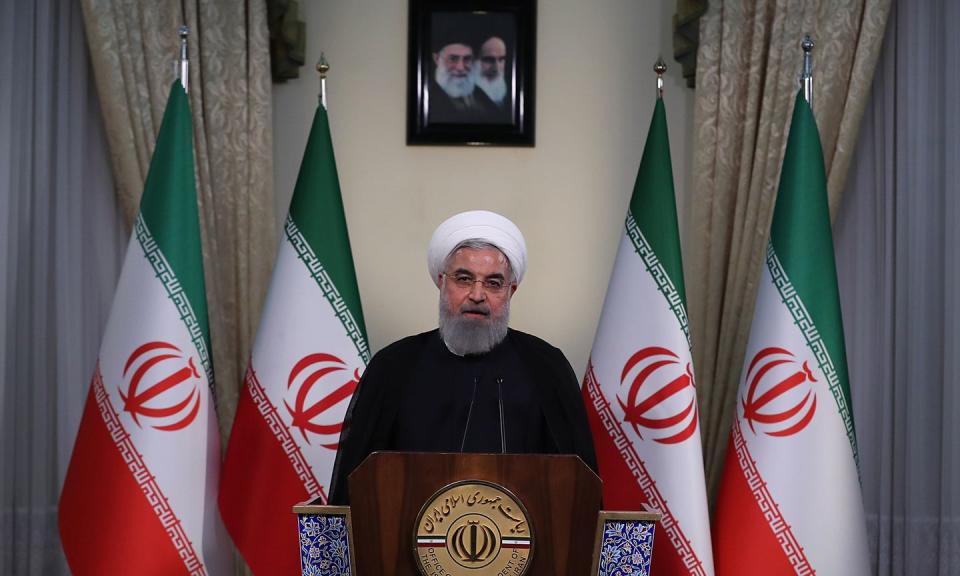Trump's Violation of the Iran Deal Is a Bad Play

Donald Trump ran for office saying he was the best deal maker for America. On Tuesday, he announced that he was walking away from the Iran nuclear agreement, arguing he could get a better deal than the one Barack Obama struck in 2015. He may well have been right. A better deal was in the offing, but by withdrawing from the current agreement he made getting it that much more unlikely.
Trump’s decision effectively torpedoed the effort of key European allies to try and improve on the deal, leaving them increasingly convinced that their views no longer matter in Washington. It also further destabilizes the Middle East, as Iran and its neighbors again worry about who will try and get the bomb first. And it sends an unmistakable message to North Korea that any deal it signs with this administration can be undone by the next. None of that adds up to the win Trump so clearly craves.
Trump never liked the Iran deal. It’s an “insane” agreement, he’s said, and called it “the worst deal ever.” Last year, he repeatedly said he wanted to withdraw from the agreement. And this January he declared he would do so this month unless the European parties to the agreement were willing to negotiate a better one.
The president listed three main concerns to be addressed: Iran’s ballistic missile program, its regional behavior, and the fact that key provisions of the deal (including limits on the production of nuclear materials) would sunset in 2030.

For the past four months, top officials from Britain, France, Germany, and the United States have met frequently to hammer out an agreement to address these three issues. And they made significant progress.
The Europeans agreed to impose stiff sanctions in case Iran continued development of longer range missiles. They also agreed to take a much stronger stance against Iran for its regional misbehavior in Iraq, Syria, and Yemen.
Most importantly, they agreed that if Iran were to restart production of nuclear materials in 2030 and came within less than a year of being able to produce a nuclear bomb, they would reimpose sanctions. The one thing the Europeans were not prepared to do was to demand Iran agree to these terms or in any other way rewrite the actual deal.
Trump wasn’t satisfied. He wanted to rewrite the deal now. But rather than using the next 12 years to see how the Europeans would help achieve his core aims, he walked away from the one agreement that effectively capped Iran’s nuclear program for another decade. He could have had the better deal he wanted. The Europeans met him more than half way. It would have been a triumph of diplomacy. A real win. But Trump wanted more.
In so doing, the president got a whole lot less than we currently have. By walking away, the nuclear deal effectively becomes null and void. America has violated its terms, and now so can Iran. It can start enriching uranium tomorrow without limit. It can limit the most intrusive inspections. It can act today in ways Trump and the critics of the deal thought was unacceptable twelve years from now.
Worse, our European allies now realize that trying to engage with this administration to settle differences really does not matter. Trump’s Iran decision follows other decisions America’s allies strongly opposed: abandoning U.S. participation in the Trans-Pacific Partnership, withdrawing from the Paris agreement on climate chance, moving the U.S. embassy to Jerusalem, imposing stiff tariffs on steel imports. Each time Europeans tried to dissuaded Trump from taking these actions. Each time they failed. The lesson is clear. Allies no longer count in Trump’s Washington.
That isn’t the only lesson, however. By abandoning real constraints on Iran’s nuclear program, the Trump administration is sending a signal that diplomacy and negotiations aren’t a real option when it comes to preventing nuclear proliferation-perhaps the gravest threat to global security we face.

However imperfect, the Iran deal capped its nuclear program for fifteen years and kept a highly intrusive inspection regime in place for much longer. Now, uncertainty about what Iran will do will give other regional actors like Egypt, Saudi Arabia, even Turkey, a reason to think again about their own non-nuclear status. They will hedge against a possible Iranian nuclear breakout by leaving open the option of getting their own nuclear weapons. That is a recipe for instability, miscalculation, and possibly even war.
And what lesson should Kim Jong-un learn from all this? Trump officials say that it sends a clear signal that Washington isn’t interested in just any deal-it wants complete denuclearization. But Pyongyang likely sees the decision as proof the United States cannot be trusted-that any deal reached with one president can be discarded by the next. That will make reaching any agreement with North Korea that much more difficult.
It also sends the message that when it comes to North Korea’s nuclear program, Trump wants an all-or-nothing deal. Anything short of complete denuclearization-no nuclear weapons, no nuclear production facilities, no nuclear research, and highly intrusive inspections-would be a bad deal. Anything like the Iran agreement-no weapons, but allowing limited, verifiable production of some nuclear materials-would be unacceptable.
Yet, with North Korea possessing 60 weapons or more, large uranium and plutonium production facilities, and no inspectors on the ground, an Iran-like deal with Pyongyang would be a miraculously grand achievement. That, too, now seems beyond reach.
Ivo Daalder is president of the Chicago Council on Global Affairs and former U.S. ambassador to NATO.
You Might Also Like

